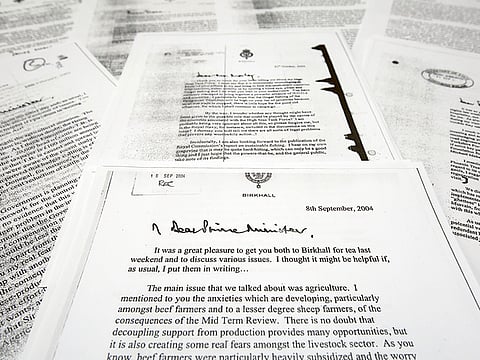Polite and persistent pen of Prince Charles
Heir’s private letters show a man dedicated to the details of his interests

LONDON: Private letters from Prince Charles to British ministers that were released on Wednesday after a decade-long court battle show the heir to the throne to be polite, persistent and knowledgeable about topics such as the survival of the albatross and the Patagonian toothfish and the state of organic agriculture.
Though Charles urges Tony Blair, who was prime minister at the time, and some of his ministers to be mindful of the bureaucratic burden imposed on Britain’s farmers, and he suggests that they allow the country’s badgers to be culled despite “the badger lobby,” the letters do not seem overbearing or especially demanding. Replies to the prince are polite, detailed and often a month or more after his original letter.
The letters, known ominously as the “black spider memos,” can seem anodyne, like knowledgeable letters to the editor. Denis MacShane, a former Foreign Office official who saw them, compared them to the views of a retired bishop or civil servant.
But given the sensitivity of the monarchy’s relationship to the government of the day — the royals are to reign, not rule — the effort of the prince to the throne to influence policy is controversial, even if his prescriptions are not especially bold.
MacShane said that the Foreign Office did not take the memos particularly seriously, but he defended the prince’s right to communicate privately with ministers. This is presumably what Queen Elizabeth II does in her regular audiences with her prime minister.
“The problem is no member of the royal family will ever dare to write a letter to the government again for fear their private views will be front-page news,” MacShane told the BBC. “I think he should be able to communicate with the government privately.”
One of Prince Charles’ letters for instance, to Blair, on September 8, 2004, deals in intricate detail with the concerns of farmers and urges the government “to encourage people to buy British” within the limits of European Union regulations. He suggests the procurement by the government of British beef. And the prince urges Blair to work to cut down “the bureaucratic and administrative burden on farmers.”
“Vigilance is essential to help officials resist returning to type!” he writes.
At the end of that letter, Prince Charles discusses a visit he made to the military in Northern Ireland and bemoans the poor performance of the British Lynx helicopter used in Iraq. He says that there were delays in replacing the Lynx, and he complains that “I fear that this is just one more example of where our Armed Forces are being asked to do an extremely challenging job (particularly in Iraq) without the necessary resources.”
The letter prompted a detailed response from Blair, but not until October 11, more than a month later.
In a letter dated February 24, 2005, Prince Charles acknowledges the chance that his candid correspondence could become public when he responded to Blair’s requests to put his views in writing — “despite the Freedom of Information Act!”
That letter concentrates on agriculture and the slaughter of cattle for bovine tuberculosis, and “my anxiety about this country’s lack of self-sufficiency in staple foods, such as meat and vegetables.” It also mentions climate change and European Union restrictions on herbal medicines. Blair answered, but again more than a month later, on March 30.
Other letters to departmental ministers express concern about illegal fishing, the plight of the albatross and the Patagonian toothfish, sustainable development, the diets of schoolchildren and the preservation and reuse of historic buildings, like the Armagh Gaol and Smithfield Market. The prince urges “a proper cull of badgers” despite “the badger lobby.”
A statement from the prince’s office at Clarence House defended Charles and deplored the publication of the letters. “The publication of private letters can only inhibit his ability to express the concerns and suggestions which have been put to him in the course of his travels and meetings,” the statement said.
Prime Minister David Cameron expressed disappointment that the letters were allowed to be published, and a spokesman said that the government would look for ways to tighten the law, which was amended in 2010, to prevent any such publication of letters between the monarch or the Prince of Wales and the government.



